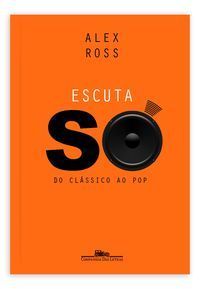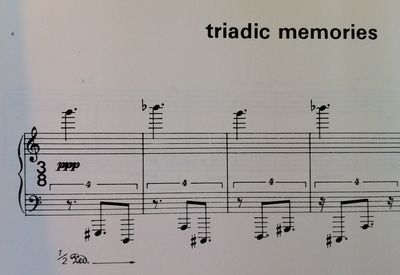Alex Ross's Blog, page 224
July 29, 2011
Brazilian appearances

Next week I will make a brief trip to Brasil for the publication of Escuta Só, or Listen to This. On August 4th, at 7:30PM, I will give my "Chacona, Lamento" lecture at the splendid Sala São Paulo. (Details here.) On August 6th, at 6PM, I will speak at the Instituto Moreira Salles in Rio, on Avenida Marquês de São Vicente. (Go here for the Institute's online tribute to Pixinguinha.) Both events are part of a series of lectures celebrating the twenty-fifth anniversary of my Brazilian publisher, Companhia des Letras.
July 27, 2011
At the graves of Wagner and Russ
July 26, 2011
Bruckner extras (1)
 In this week's New Yorker I have a column about Prof. Dr. Anton Bruckner, on the occasion of the Cleveland Orchestra's Bruckner festival at Lincoln Center. The orchestra has DVD recordings of the four symphonies it played in the series: the Fifth, the Seventh, the Eighth (in the 1887 version), and the Ninth. I've heard only the last two; both are recommendable, the first for giving the best account to date of the original version of the symphony, the second for the sustained brilliance of the playing. Off the top of my head, here are a few other Bruckner recordings I cherish: the Ninth, with Giulini and the Vienna Philharmonic (DG); the Eighth, with Boulez and the Vienna Philharmonic (DG); the Fifth, with Furtwängler and the Berlin Philharmonic (Music & Arts); the Fourth, with Jochum and the Berlin Philharmonic (DG); the Sixth, with Klemperer and the New Philharmonia (EMI); Haitink's new Chicago recording of the Seventh (Resound); Norrington's bracing, unconventional view of the Third (EMI); and the Mass No. 3, with Herreweghe (Harmonia Mundi). I'm also very fond of Horenstein's late-period live recordings of the Eighth and the Ninth from the BBC. (Horenstein's Vox Ninth was my first record.) When I was younger, I immersed myself in Karajan's Bruckner; for whatever reason, I found those recordings much less satisfying when I recently returned to them. I have yet to find my way into the cult of Celibidache, despite various efforts. As for the various completions of the Ninth, discussed briefly at the end of the column, I'll say more in a future post. For the moment, I can hardly improve on Richard Lehnert's comprehensive coverage of the subject in Stereophile. By the way, you can watch a weird dance piece based on the Ninth finale, although it will not be suitable for the more puritanical American workplaces. Don't worry — the hip-hop heard at the outset is not part of the score.
In this week's New Yorker I have a column about Prof. Dr. Anton Bruckner, on the occasion of the Cleveland Orchestra's Bruckner festival at Lincoln Center. The orchestra has DVD recordings of the four symphonies it played in the series: the Fifth, the Seventh, the Eighth (in the 1887 version), and the Ninth. I've heard only the last two; both are recommendable, the first for giving the best account to date of the original version of the symphony, the second for the sustained brilliance of the playing. Off the top of my head, here are a few other Bruckner recordings I cherish: the Ninth, with Giulini and the Vienna Philharmonic (DG); the Eighth, with Boulez and the Vienna Philharmonic (DG); the Fifth, with Furtwängler and the Berlin Philharmonic (Music & Arts); the Fourth, with Jochum and the Berlin Philharmonic (DG); the Sixth, with Klemperer and the New Philharmonia (EMI); Haitink's new Chicago recording of the Seventh (Resound); Norrington's bracing, unconventional view of the Third (EMI); and the Mass No. 3, with Herreweghe (Harmonia Mundi). I'm also very fond of Horenstein's late-period live recordings of the Eighth and the Ninth from the BBC. (Horenstein's Vox Ninth was my first record.) When I was younger, I immersed myself in Karajan's Bruckner; for whatever reason, I found those recordings much less satisfying when I recently returned to them. I have yet to find my way into the cult of Celibidache, despite various efforts. As for the various completions of the Ninth, discussed briefly at the end of the column, I'll say more in a future post. For the moment, I can hardly improve on Richard Lehnert's comprehensive coverage of the subject in Stereophile. By the way, you can watch a weird dance piece based on the Ninth finale, although it will not be suitable for the more puritanical American workplaces. Don't worry — the hip-hop heard at the outset is not part of the score.
Coming up shortly: a quick look at Bruckner scholarship.
July 25, 2011
Merkel remains calm
One can only assume that total global economic collapse isn't imminent if Angela Merkel felt free to enjoy a full day of Wagner at the opening of the Bayreuth Festival. Or perhaps she loves her Wagner a little too much? ("No, Mr. President, you can't check in with Merkel, it's the middle of Act II.") In any case, here she is at the end of the second intermission of Tannhäuser, with brass players delivering the traditional take-your-seats signal.
Bruckner Festival
The Stone Carver. The New Yorker, Aug. 1, 2011 (subscribers only).
July 24, 2011
Bruckner festival
The Stone Carver. The New Yorker, Aug. 1, 2011 (subscribers only).
There is an error in the online abstract: it should say "forbidding monumentalist," not "forbidden monumentalist."
Spirit Cruises
The other night, in the company of Seated Ovation, I ventured through suffocating heat to Bargemusic, under the Brooklyn Bridge, where Blair McMillen played Triadic Memories, Morton Feldman's biggest and perhaps most beautiful work for piano. The concert was up against not only hostile weather conditions but also an outdoor showing of Sweet Smell of Success in the gorgeous new Brooklyn Bridge Park. (Having lived in Brooklyn Heights for much of the nineties, I'm amazed by the transformation of what used to be a grim, empty pier complex.) Nonetheless, a hardy band of Feldmanites came out to hear McMillen, and it was very much worth a trip through the outdoor oven. On our way, we passed the former site of 7 Middagh Street, the Britten-Pears-Auden hideout, and Will (Seated Ovation) informed me that Gabriel Kahane has made the house the subject of a musical, which the Public will produce next spring. I had somehow overlooked this crucial fact. I used to be able to see the ghost of the house from my window.
I've caught only one other live rendition of Triadic Memories, by the legendary new-music pianist Aki Takahashi, at the 1996 Lincoln Center Festival. (Let's take a moment to acknowledge the remarkable programs that John Rockwell presented that summer.) Feldman's later piano music took inspiration from Takahashi's miraculously translucent tone, which vaguely resembles that of Radu Lupu. McMillen, too, draws softly glowing pianissimos from his instrument, and in the opening bars (see above) he brings out more of a rhythmic lilt than do most of his recorded predecessors — almost a jazzy bounce. He has an acute feeling for those remarkable passages in which Feldman strips everything down to a unison line (B, D-flat, A-sharp, D-natural, spaced out over two octaves) or even to bell-like soundings of single notes (C# twice, E-flat three times, C-natural four times, D five times). And McMillen applies just the right amount of pedal, so that the music is enveloped in a slight mist while remaining crystalline. I hope he has a chance to record the piece: his view is one that I'd like to have in my library, alongside Takahashi's account — surprisingly speedy, clocking in at just over an hour — and cosmically spacious readings by John Tilbury and Marilyn Nonken. Chris Villars's Feldman site presently lists more than a dozen recordings.
The experience of hearing Feldman waterborne adds unexpected layers of extra-musical or semi-musical meaning. (It's not the first time: there was a Bargemusic Feldman series last year, which Steve Smith attended.) Something about the gently irregular rhythms of Triadic Memories matched the pulsation of the waves. And the music lent a novel emotional timbre to the familiar backdrop of downtown Manhattan lights and East River traffic. One by one the boats went by — water taxis, speedboats, party-central paddle steamers, "Spirit Cruises," a huge vessel with the curious name Cornucopia Majesty — and Feldman marked each one of them with an air of ineffable sadness, as if they were all sailing smoothly into oblivion.
July 22, 2011
Who was Varvara Gaigerova?
The Alaska-born violist Eliesha Nelson, who plays in the Cleveland Orchestra, has a new CD entitled Russian Viola Sonatas, with Glen Inanga at the piano. I rubbed my eyes somewhat when I studied the tracklist and discovered not only that the Shostakovich sonata was not there but that the composers included — Varvara Gaigerova, Alexander Winkler, and Paul Juon — were entirely new to me. The Gaigerova Suite Op. 8, the beginning of which you can hear in the video preview above, is particularly striking — a Scriabinesque score in four brief, pungent movements. Relatively little is known of the composer, who had a short life, dying in 1944 at the age of forty. (I can find no information about how she died.) She studied at the Moscow Conservatory with Neuhaus, Catoire, and Miaskovsky, and later played piano at the Bolshoi Theater. She had a strong interest in the ethnic musical traditions of the Soviet Union and wrote a symphony on Kalmyk themes. From this posting on Bob Shingleton's Overgrown Path I suspect that the conductor John McLaughlin Williams, an avid sleuth of unsung composers, had something to do with bringing Gaigerova's music further to light. The CD is beautifully played throughout; Nelson's tone is strikingly rich and warm.
Footnote: Thanks to John Luther Adams I am able to say that I have actually been to Nelson's hometown of North Pole, Alaska (see last photo in this post).
La Scala mob pursues Andrew Porter
In the August issue of Opera News, William Braun interviews Andrew Porter, my immensely distinguished New Yorker predecessor, whom many people would consider the greatest music critic alive. (I certainly endorse that proposition.) The interview doesn't yet seem to be online, but it has the following wonderful story:
BRAUN: With all of the hundreds of people you've reviewed, has anyone ever taken great umbrage? Has anyone ever come after you?
PORTER: I gave offense to Colin Graham once by saying there were cheap touches in his Coronation of Poppea, which he did at the ENO. It was just a disagreement, really, that's all. But there's someone who looks rather like me who was attacked in the lobby of La Scala, thrown to the floor and kicked. I was thought to have been unappreciative of the prima donna Leyla Gencer. People were yelling, 'How could you say what you said about our Leyla Gencer!' And the poor man was crying, "I'm not Andrew Porter! I'm not Andrew Porter!"
July 21, 2011
Books received (2): Curran in Roma
Alvin Curran: Live in Roma is the title of a new book from the Milanese record label and publishing house Die Schachtel, which gives attention to the Italian and American avant-gardes. (Forced Exposure distributes it in the U.S.) When I was in Rome last month, I was happy to meet Curran, with whom I'd exchanged numerous e-mails over the years. The composer has been in Rome for nearly five decades, and now lives with his wife, Susan Levenstein, in an apartment with a spectacular view of the Colosseum. The Schachtel book has, among other things, an absorbing long conversation between Curran and David Bernstein, who teaches at Mills College and edited the recent history about the San Francisco Tape Music Center. In one passage, Curran wonderfully evokes the atmosphere of Rome in the mid-1960s:
There were characters left and right; it was like some unwritten children's book that I myself was part of; and every time I turned a page I'd meet a new character. And they weren't just "any" characters. Right off the bat I met Fellini; I met Antonioni, Bertulucci, I met these characters, some were famous, some were known, some were unknown; I met a lot of great people at that time such as Julian Beck and Judith Malina of the Living Theater, and Robert Wilson, who suddenly showed up out of nowhere and did Deaf Man Glance. I mean this place was jumping. Giuseppe Chiari, my god, there's a guy, a genius; he died very recently, I consider him one of my main teachers. He was the heart and soul of Fluxus and beyond and largely unrecognized in the music world, but a darling of the art world and internationally.
Nam June Paik is suddenly here in Rome with Charlotte Moorman at the Feltrinelli bookstore, and she's immersed in an oil drum full of water with propellers on her breasts. I'm mixing up a couple of years—basically it's 1965-67—that I'm compressing into this memory lane. Earle Brown shows up; Morty Feldman is here; Elliott Carter, Barbara Mayfield, and Allan Bryant, a very interesting person, who already in the very first days of MEV [the pioneering electronic improvisation group Musica Elettronica Viva], was constructing these amazing stringed instruments; everyone was making stringed instruments, but he was making stringed instruments not just with metal strings, like guitars with weird tunings. He was making them out of rubber bands and using motor propellers to play them. I'm telling you, I'm just dropping, like, about an eighth of all of the stuff that was going on. Can you imagine? The Living Theater, and all this was happening, not just like a fairytale, but like a children's storybook that's preparing you for a revolution, and I didn't know that. I felt something in the air and so did everybody else; but had no idea what.
Curran is insufficiently celebrated both in his native America and in his adopted homeland. Above is a video of a recent work, Oh Brass on the Grass Alas — a play, of course, on Gertrude Stein's famous line for Virgil Thomson, "Pigeons on the grass alas." It was first staged at the Donaueschingen Festival in 2006; Curran wrote about it for the New York Times's fantastic Score blog. This is perhaps something for Make Music NY to take a look at! Curran's well-stocked website is here.
Alex Ross's Blog
- Alex Ross's profile
- 425 followers






